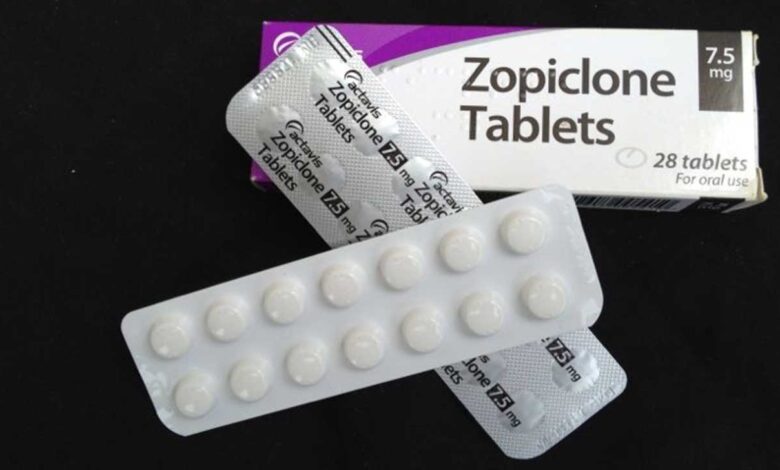Does Zopiclone Cause Weight Gain?

Zopiclone, sold under the brand name Imovane among others, is a nonbenzodiazepine used to treat difficulty sleeping. Zopiclone is molecularly distinct from benzodiazepine drugs and is classed as a cyclopyrrolone. It helps you fall asleep more quickly, and also helps stop you waking up during the night. Zopiclone comes as tablets, it also comes as a liquid for people who find it hard to swallow tablets, but this has to be ordered specially by your doctor.
Zopiclone is only available on prescription, it is a controlled substance in the United States, Japan, Brazil, and some European countries, and may be illegal to possess without a prescription. In Canada, Zopiclone is classified as a Schedule-IV controlled drug within the CDSA. However, it is readily available in other countries and is not a controlled substance. Zopiclone is known colloquially as a “Z-drug”.
How To Use Zopiclone
Read the Patient Information Leaflet provided by your pharmacist before you start taking zopiclone and each time you get a refill. If you have any questions, consult your doctor or pharmacist.
Take this medication by mouth as directed by your doctor, usually once nightly just before bedtime. Dosage is based on your medical condition, age, other medications you may be taking, and response to treatment. Be sure to tell your doctor and pharmacist about all the products you use (including prescription drugs, nonprescription drugs, and herbal products). Follow your doctor’s instructions carefully. Do not take more of this medication than prescribed because your risk of side effects will increase.
Although unlikely, this drug may rarely cause temporary memory loss. To avoid this effect, do not take a dose of this drug unless you have time for a full night’s sleep of at least 7 to 8 hours. This amount of time is needed for your body to get over the effects of this drug. For example, do not take zopiclone to help you sleep during an overnight plane flight of less than 7 to 8 hours.
If you suddenly stop using this medication, you may have withdrawal symptoms (such as stomach/muscle cramps, shaking, sweating, anxiety, vomiting, rare seizures). To help prevent withdrawal, your doctor may lower your dose slowly. Withdrawal is more likely if you have used zopiclone for a long time or in high doses. Tell your doctor or pharmacist right away if you have withdrawal.
Though it helps many people, this medication may sometimes cause addiction. This risk may be higher if you have a substance use disorder (such as overuse of or addiction to drugs/alcohol). Do not increase your dose, take it more often, or use it for a longer time than prescribed. Properly stop the medication when so directed.
When used for an extended period, this medication may not work as well and may require different dosing. Talk with your doctor if this medication stops working well.
You may have trouble sleeping the first few nights after you stop taking this medication. This is called rebound insomnia and it is normal. It will usually go away after 1 to 2 days. If this effect continues, contact your doctor. Tell your doctor if your condition persists after 7 to 10 days, or if it worsens.

Does Zopiclone cause weight gain?
Yes, weight gain is one of the side effects reported by people who take Zopiclone, especially for people who are female, 60+ old, have been taking the drug for less than 1 month. Available data indicates that 31,294 people reported to have side effects when taking Zopiclone. Among them, 728 people (2.33%) have Weight gain.
What other side effects can Zopiclone cause?
Along with its needed effects, a medicine may cause some unwanted effects. Although not all of these side effects may occur, if they do occur, they may need medical attention.
Check with your doctor as soon as possible if any of the following side effects occur:
More common
- confusion—more common in older adults
- clumsiness or unsteadiness—more common in older adults
- daytime anxiety and/or restlessness
- difficulty with coordination—more common in older adults
- mood or mental changes
Less common
- Drowsiness (severe)
- shortness of breath
- difficult or labored breathing
- tightness in chest
- wheezing
- skin rash
- aggressiveness
- behavior changes
Rare
- Memory problems—more common in older patients
- behavior or mental changes
Symptoms of overdose
Get emergency help immediately if any of the following symptoms of overdose occur:
- Clumsiness
- unsteadiness
- mental or mood changes
- drowsiness (severe)
- unusual tiredness or weakness
- sluggishness
- reduced physical activity
- unusual sleepiness
- loss of consciousness
Some side effects may occur that usually do not need medical attention. These side effects may go away during treatment as your body adjusts to the medicine. Also, your health care professional may be able to tell you about ways to prevent or reduce some of these side effects. Check with your health care professional if any of the following side effects continue or are bothersome or if you have any questions about them:
More common
- Dizziness
- Dryness of mouth
- heartburn
- impaired vision
- increased appetite
- indigestion
- loss of appetite—more common in older adults
- stomach upset
- difficulty speaking
- constipation
- decreased muscle tone
- weight loss
Less common
- Agitation—more common in older adults
- chills
- fast, irregular, or pounding heartbeat—more common in older adults
- feeling of heaviness of arms and legs
- increase in the amount of saliva—more common in older adults
- increased sweating—more common in older adults
- tingling, burning or prickly sensation
- trembling and shaking of fingers, hands, arms, feet, or legs—more common in older adults
- vomiting—more common in older adults
After you stop using zopiclone, it may still produce some side effects that need attention. During this period of time, check with your doctor immediately if you notice the following side effects:
- Abdominal or stomach cramps or pain
- nausea
- vomiting
- more difficulty in sleeping than before treatment
- muscle cramps or discomfort
- anxiety
- nervousness
- irritability
- restlessness
- increased sweating
- tremors
- seizures
Zopiclone may cause you to have a coated tongue, bad breath, or a bitter taste. These effects are to be expected when you are taking zopiclone.
Other side effects not listed may also occur in some patients. If you notice any other effects, check with your healthcare professional.
Call your doctor for medical advice about side effects. You may report side effects to the FDA at 1-800-FDA-1088.
You Can Find Out More About Medications and Weight Gain On: Does Xanax Cause Weight Loss or Weight Gain?



